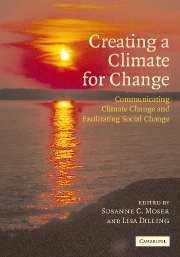Book contents
- Frontmatter
- Contents
- Preface
- Foreword
- List of contributors
- List of tables
- List of figures
- List of text boxes
- Introduction
- Part I Communicating climate change
- Part II Facilitating social change
- 15 Stuck in the slow lane of behavior change? A not-so-superhuman perspective on getting out of our cars
- 16 Consumption behavior and narratives about the good life
- 17 Educating for “intelligent environmental action” in an age of global warming
- 18 Education for global responsibility
- 19 Changing the world one household at a time: Portland's 30-day program to lose 5,000 pounds
- 20 Changing organizational ethics and practices toward climate and environment
- 21 Change in the marketplace: business leadership and communication
- 22 The market as messenger: sending the right signals
- 23 Making it easy: establishing energy efficiency and renewable energy as routine best practice
- 24 Forming networks, enabling leaders, financing action: the Cities for Climate Protection™ campaign
- 25 Ending the piecemeal approach: Santa Monica's comprehensive plan for sustainability
- 26 States leading the way on climate change action: the view from the Northeast
- 27 West Coast Governors' Global Warming Initiative: using regional partnerships to coordinate climate action
- 28 Building social movements
- 29 Climate litigation: shaping public policy and stimulating debate
- 30 The moral and political challenges of climate change
- Part III Creating a climate for change
- About the authors
- Index
- References
18 - Education for global responsibility
Published online by Cambridge University Press: 20 August 2009
- Frontmatter
- Contents
- Preface
- Foreword
- List of contributors
- List of tables
- List of figures
- List of text boxes
- Introduction
- Part I Communicating climate change
- Part II Facilitating social change
- 15 Stuck in the slow lane of behavior change? A not-so-superhuman perspective on getting out of our cars
- 16 Consumption behavior and narratives about the good life
- 17 Educating for “intelligent environmental action” in an age of global warming
- 18 Education for global responsibility
- 19 Changing the world one household at a time: Portland's 30-day program to lose 5,000 pounds
- 20 Changing organizational ethics and practices toward climate and environment
- 21 Change in the marketplace: business leadership and communication
- 22 The market as messenger: sending the right signals
- 23 Making it easy: establishing energy efficiency and renewable energy as routine best practice
- 24 Forming networks, enabling leaders, financing action: the Cities for Climate Protection™ campaign
- 25 Ending the piecemeal approach: Santa Monica's comprehensive plan for sustainability
- 26 States leading the way on climate change action: the view from the Northeast
- 27 West Coast Governors' Global Warming Initiative: using regional partnerships to coordinate climate action
- 28 Building social movements
- 29 Climate litigation: shaping public policy and stimulating debate
- 30 The moral and political challenges of climate change
- Part III Creating a climate for change
- About the authors
- Index
- References
Summary
Introduction
Individual human beings affect the global story: small actions in the microcosm have consequences in the macrocosm. The climate change now under way represents a systemic disruption that is the greatest threat on the human horizon, requiring basic changes in habits of thought that link global change to individual and local behavior. Such changes in ways of thinking or acting are costly both economically and psychologically, and will occur only when the threat to the integrity of planetary systems is felt as deeply relevant – as directly connected to the individual. Raising the awareness of climate change in adults and children is not only a matter of conveying the facts of temperature or composition of the atmosphere or the threats that changes in these present. Unless individuals begin to identify themselves as part of the process and identify with it, they will not be willing to change.
Human beings do typically live and act in multiple worlds, each one providing a context for the development of a sense of identity-in-relationship, each one potentially more inclusive. The infant begins with a sense of herself as part of the mother–infant dyad and gradually becomes aware of being distinct within it, developing through households and communities and all the contexts of life. The goal of education for global responsibility must be to give each child a continuing sense of his or her value and responsibility as a part of these larger contexts.
- Type
- Chapter
- Information
- Creating a Climate for ChangeCommunicating Climate Change and Facilitating Social Change, pp. 281 - 291Publisher: Cambridge University PressPrint publication year: 2007
References
- 3
- Cited by



